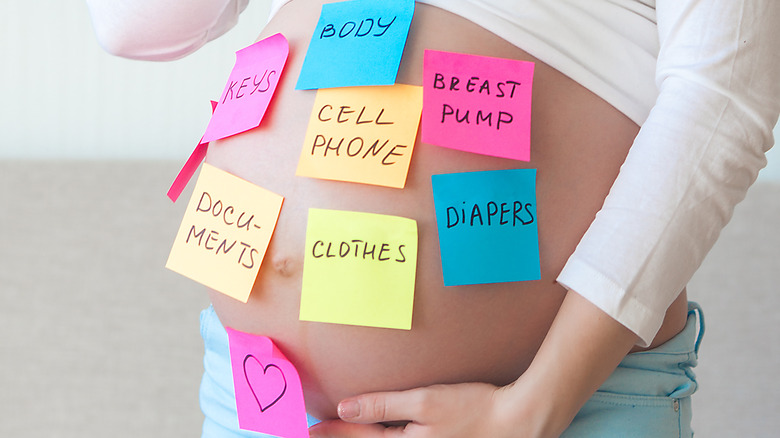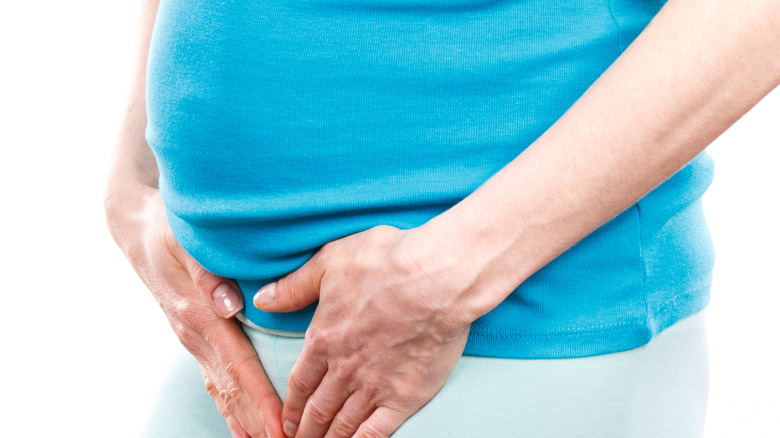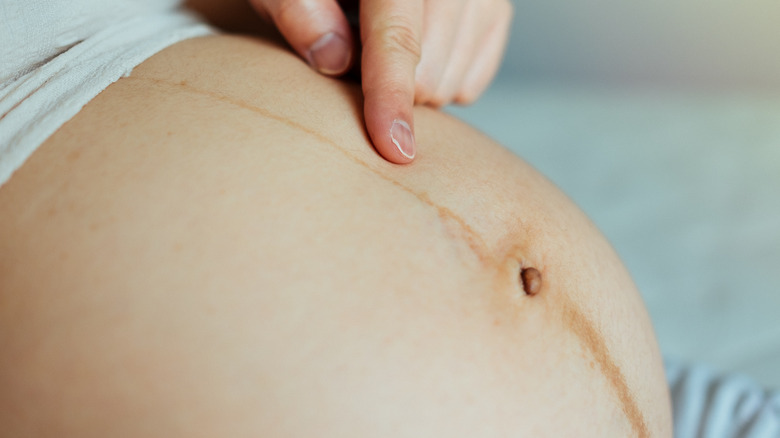13 Things You Didn't Know Happened To Your Body During Pregnancy
Isn't it amazing how a woman can grow a tiny human in nine months? As a result, it should be no surprise that the female body changes during this process. Some changes may be unexpected or unusual. It is, however, entirely normal for some strange things to occur during pregnancy. After all, another human is inside, and the female body must adapt to produce a healthy baby (via March of Dimes). Even if symptoms are perplexing, there are explanations for them. Like humans, pregnancy is unique; each pregnancy will be a distinctive experience.
According to Live Science, most people are familiar with typical pregnancy symptoms such as morning sickness, exhaustion, and physical changes in the growing uterus. Still, other symptoms may not be discussed openly, like hemorrhoids, skin and hair changes, and excessive gas or leakage from areas you were not expecting. You should know that you are not alone if you experience these symptoms. The critical thing to remember is that you are bringing a tiny human into the world — and before you know it, the symptoms that once worried you will be a distant memory.
Pregnancy brain: myth or reality?
When it comes to pregnancy and all the changes your body goes through, it's not surprising you may have some brain fog or moments of forgetfulness. Don't be concerned; it's not permanent, and it may not even occur in every pregnancy. Aside from the hormonal changes that occur during pregnancy, becoming a mother is emotionally and physically demanding, and can undoubtedly divert your attention while increasing forgetfulness (via Enfamil).
According to maternal-fetal medicine specialist Dr. Abdelaziz Saleh, pregnancy brain is a legitimate experience (via Akron Children's Hospital). Hormones fluctuate throughout the body as a result of pregnancy, and these surges of hormones affect the neurons in the brain, causing forgetfulness. However, research on the exact cause of this phenomenon is mixed.
Healthline mentions a few noteworthy measures to improve mental clarity. Among these suggestions is getting enough rest. Sleep deprivation can turn your mind to mush. A good night of sleep or a short nap can help you get through the day. Brain clarity is also affected by nutrition. You may have a voracious appetite while pregnant; eating foods rich in Omega-3 fatty acids and antioxidants can help improve mental clarity. Hydration goes hand in hand with nutrition, so ensure you get enough water. Even mild dehydration can impair concentration and energy levels. Setting reminders is another effective method for combating "momnesia" and staying on top of important tasks and appointments. Finally, remember that pregnancy brain is a common problem that will eventually subside.
Reasons your bladder may leak (and why you may want to pee frequently)
In addition to increasing anxiety during an already difficult period, many pregnant women have bladder leakage and an increased urgency to urinate. In a study published in the International UroGynecology Journal, stress urinary incontinence affects approximately 54% of all pregnant women. Fortunately, for most women, these annoying leaks and constant trips to the bathroom will stop soon after the baby is born.
As hormone levels rise, your muscles and surrounding ligaments become weaker and floppy throughout pregnancy. Your pelvic floor muscles support your bladder, so as they relax, you may need to urinate more frequently or experience leakage when you exert pressure on your bladder (such as while coughing, sneezing, making abrupt movements, or exercising). Additionally, throughout pregnancy, your blood volume increases. As a result, your urinary system is exposed to more fluid, which increases the urge to urinate. As if those were not enough causes for this aggravation, pressure is put on the bladder, and pelvic floor muscles as your baby grows and the uterus expands. As you approach your last trimester of pregnancy, you can anticipate a rise in your leakage or frequency (via the National Association for Continence).
Specific exercises such as kegel exercises can help strengthen the pelvic floor muscles. In addition, the Cleveland Clinic recommends avoiding caffeinated or carbonated beverages to reduce urgency and leaks.
What happens to your senses during pregnancy?
Pregnancy hormones may be to blame if your favorite scents suddenly make you nauseous. As a result, you may feel like your nose is working overtime. According to a study published in Frontiers in Psychology, many pregnant women experience an increased sense of smell beginning in the first trimester. However, more research is needed to determine whether the cause is linked to increased HCG levels, estrogen levels, or both. This increased sensitivity to odors contributes to nausea and vomiting that may be experienced during pregnancy.
Many pregnant women also experience changes in their taste buds. Even your favorite foods may begin to repulse you to the point where you can't even think about them, let alone eat them. The Cleveland Clinic calls this condition dysgeusia. Food may taste metallic due to the hormones produced during pregnancy, and things that you have always enjoyed may no longer taste the same. The good news is that most pregnancy taste aversions subside after the first trimester.
Although you may be aware of changes in taste and smell during pregnancy, you may be surprised to learn that being pregnant can change your vision (via WebMD). Some women have dry eyes, which can irritate them, especially when wearing contact lenses. If you have dry eyes, you can use artificial tears to relieve them, but consult your healthcare provider first. If you notice changes in your vision, talk to your doctor to ensure nothing serious is causing the changes.
Are strange food cravings common during pregnancy?
It is common for pregnant women to experience strange food cravings on occasion. It is unclear whether hormones are to blame or your body requires deficient nutrients. These cravings can be caused by various factors (via Pregnancy, Birth, and Baby).
Per Intermountain Healthcare, some of the most common cravings may be symbolic of something more profound. Consider pickles, a popular food among pregnant women. Did you know that low sodium levels could cause this impulse? If you crave pickles, the good news is that they are low in calories and will not cause weight gain. If you need a mood booster, chocolate may be desired. Chocolate raises the levels of happy chemicals in your brain. To maintain a healthy pregnancy weight, limit your chocolate consumption. Similarly, you may have a strong desire for red meat, a possible sign that your body requires more protein or iron. Red meat isn't always bad if you choose leaner cuts.
According to WebMD, pregnant women may develop nonfood cravings (like dirt, crayons, ice, and even laundry starch). This phenomenon is known as pica, a poorly understood condition that is thought to be related to iron or mineral deficiencies (though there is no solid research to support that theory).
Keep in mind that cravings throughout pregnancy are common. While it's acceptable to indulge in them occasionally, don't be afraid to speak with your doctor if you believe your cravings are harmful to you or your unborn child.
Your face may break out like a teenager
Were you looking forward to that pregnancy glow, only to wake up with your face breaking out like a teenager? According to Premier Health, pregnancy increases oil production, which can lead to an increase in acne. Acne is more likely to develop during the first trimester. If you are prone to breakouts during your menstrual cycle, you will likely develop them during pregnancy. The good news is that your acne problems should improve as your hormones stabilize.
According to WebMD, you should stop taking acne medications before becoming pregnant and consult your doctor before using over-the-counter acne prevention remedies. Most oral acne medications are harmful during pregnancy; many have been linked to congenital abnormalities. Even topical medications can be detrimental to a pregnant woman and her fetus. Safe alternatives may improve your complexion while pregnant, such as limiting your face washing to two times per day and using a clean washcloth each time. Over-cleansing the face can cause more oil production and breakouts. You can also avoid touching your face and washing your pillowcase more frequently. While pregnant, it is best to seek medical advice to ensure that any remedy you use is safe for you and your unborn baby.
Why your body swells during pregnancy
You can expect your belly to grow during pregnancy, but you will also experience swelling in other areas. According to the American Pregnancy Association, your blood and fluid volume nearly doubles during pregnancy to meet the demands of the developing baby. As your pregnancy progresses, your body begins to retain fluids in preparation for fluid loss and to prepare your joints during labor. Swelling in the extremities, particularly the feet, ankles, and hands, is a normal part of pregnancy. You may also experience swelling in your face near the end of your pregnancy.
An article in Premier Health mentions Dr. David McKenna's suggestions for reducing swelling, especially during the third trimester. He suggests drinking at least eight glasses of water daily, avoiding caffeine and salty foods, and elevating your feet as much as possible throughout the day. Finally, if you have access to a tub or pool, sitting in it can help relieve pressure and reduce swelling. Remembering that swelling is a normal part of the pregnancy process is critical. However, if you experience sudden swelling and are concerned, you should always contact your healthcare provider, because conditions that can appear during pregnancy may require medical attention. Preeclampsia, for example, is a condition that includes swelling, high blood pressure, and protein in the urine. If you have a question or are unsure about a symptom, it is always better to be safe and seek advice from your doctor (via Healthline).
Hemorrhoids and pregnancy
Many individuals find it awkward to discuss hemorrhoids. Hemorrhoids, however, are a relatively common occurrence during pregnancy. They're frequently compared with varicose veins. Hemorrhoids can form internally, in the rectum, or externally, outside the anus. When you have a bowel movement, you could feel discomfort, irritation from time to time, or see bright red blood. On a positive note, if hemorrhoids develop during pregnancy, they will usually improve after delivery (via Premier Health).
According to the Office of Women's Health, there are a few reasons pregnancy increases the risk of hemorrhoid development. Because blood volume increases during pregnancy, veins near your anus can swell, resulting in hemorrhoids. The growing uterus also plays a role in the development of hemorrhoids. As the uterus grows, extra weight is placed on the vessels.
An article in Medical News Today mentions a few interventions that can ease pregnancy-related symptoms, including eating a diet high in fiber to prevent constipation, lying on your left side to reduce pressure, and purchasing a soft cushion for comfort when sitting. Contact your doctor to discuss other options for relief, such as stool softeners, laxatives, and creams.
Why you may have frequent gas and bloating
Pregnancy gas is a real thing that you will experience throughout your pregnancy. Gas can manifest itself in various ways, including bloating, burping, and farting multiple times per day. It can be embarrassing for some, because it is frequently an issue you have no control over, as your muscles are weaker during pregnancy (via WebMD).
According to the American Pregnancy Association, gas accumulation during pregnancy is caused by an increase in progesterone. This hormone relaxes your muscles to prepare your body for the growing baby and delivery, but it also causes the digestive system to move slower, increasing bloating, gas, and indigestion. Although avoiding gassy episodes during pregnancy is nearly impossible, some foods can exacerbate gas symptoms. Individuals may notice that different foods have a more significant impact on them.
According to Baby Center, certain foods and food groups are notorious for causing more gas symptoms, which you should consider avoiding if gas is a problem. Beans, whole grains, certain types of vegetables, and foods high in fructose, fat, and dairy are some examples. This may sound intimidating, as many healthy foods can be members of the gas-producing family. The best action is to keep track of what makes you gassy and avoid those foods.
Darkening of the skin during pregnancy
When it comes to pregnancy, changes to your skin are inevitable. Stretch marks are common as your baby grows and the skin around your belly tightens. Stretch marks result from microscopic tears in the tissues that develop as the skin stretches. The elasticity of the skin may affect how stretch marks manifest in women. Don't be alarmed if you develop some in other areas such as the thighs, breasts, or buttocks; these marks may diminish after childbirth (via UNM Health).
Pregnancy can also cause darkening in certain body areas, such as the areolas. The precise reason why some areas darken more than others is unknown. Most doctors attribute this discoloration to an increase in melanin production by the placenta, which also causes the dark line that runs down the middle of your stomach to your pubic area. The line is known as linea nigra, per the Cleveland Clinic. These discolorations will typically fade a few weeks after giving birth.
Totally natural ways pregnancy alters your vagina
Your vagina will change during pregnancy, and while some changes may surprise you, they are entirely normal. According to Healthline, Chadwick's sign is one of the first changes you or your doctor may notice. This can occur as early as four weeks after conception, when your vagina, labia, and cervix turn blue or purple. This entirely natural event results from the increased blood flow brought on by pregnancy.
Another of the many vaginal changes that occur during pregnancy is an increase in vaginal discharge. This is due to hormonal changes in the cervix and vagina that cause an increase in cervical mucus. You may notice variations throughout pregnancy, from thick and sticky to thin and watery. However, if you have chunky, discolored discharge that causes itching or burning, see your doctor for an examination. Because vaginal yeast infections are common during pregnancy, discussing your concerns with your healthcare provider is best (via Virtua Health).
Healthline mentions another unusual symptom that may worry you: "lightning pain," or shooting pains that feel like a zap of electricity passing through your vagina. Yes, it's perfectly normal, because the sweet baby inside you is putting pressure on your nerve endings or cervix as it prepares to exit the womb. This discomfort can start several weeks before the due date. Take solace in the fact that most of the changes you've gone through during pregnancy will return to your pre-pregnancy state several weeks after you've given birth.
Dental health and pregnancy
During pregnancy, oral hygiene is critical. Various factors can contribute to gingivitis, cavities, and bleeding gums. According to the March of Dimes, an increase in estrogen and progesterone during pregnancy can impact dental health and cause teeth to loosen. Furthermore, because stomach acid erodes tooth enamel, hyperemesis during pregnancy may increase your risk of dental caries. When you're sick, the last thing you want to do is brush your teeth. However, if your routine oral hygiene is disrupted, your risk of dental issues increases. To maintain dental health during pregnancy, it is critical to continue with regular dental checkups.
The Centers for Disease Control and Prevention (CDC) also supports prioritizing dental care, citing that nearly 75% of pregnant women develop gingivitis, which causes swelling and irritation to the gums and puts them at a higher risk for long-term dental problems. Eating a balanced diet, brushing at least twice a day, flossing, and routine visits to your dentist will ensure healthy teeth and gums during pregnancy (via Mouth Healthy).
Snoring during pregnancy
If your significant other starts complaining about you snoring like a freight train, they may not be exaggerating. Snoring is common in 50% of pregnant women in their second trimester, according to the American Thoracic Society. Again, hormones required for a healthy pregnancy are to blame for swelling in the nasal passages, which can increase nasal congestion and cause you to snore more.
If you're lucky, you might be able to reduce or eliminate your snoring, per Healthline. Consider elevating your head while sleeping to relieve pressure on your airway, resulting in less obstruction. Sleeping on your side can also help, particularly in the final few months of pregnancy when your belly is larger. You may want to include a humidifier to increase moisture in the room (and thus reduce irritation in the airway). At bedtime, nose strips or saline spray may also be beneficial. However, before attempting those interventions, you should consult your healthcare provider.
Why you might dream more during pregnancy
According to the American Pregnancy Foundation, the exact reason for vivid dreams during pregnancy is still unknown. However, there are numerous theories, one of which is — you guessed it — hormones. Because hormone surges are known to cause emotional responses and occasionally increase anxiety, they are also thought to influence how your brain processes these emotions while you sleep, resulting in more frequent and intense dreams.
Another reason is related to how frequently you wake up at night. The need to use the bathroom in the middle of the night, or simply the inability to turn over without waking up, can disrupt your sleep as your pregnancy progresses. As you wake up more frequently and disrupt your rapid eye movement (REM) sleep, you may remember more of your dreams, giving you the false impression that you are dreaming more or experiencing more bizarre dreams (via the Sleep Foundation).
According to WebMD, some expectant mothers experience nightmares. The majority of these are related to labor anxiety or fear of how to care for a newborn. These are common as your due date approaches, but they may understandably cause concern. A study on pregnancy and sleep patterns noted that 76% of pregnant women have poor sleep quality; you are not alone. If your dreams or lack of sleep interfere with your daily activities, it is best to seek advice from your healthcare provider.














